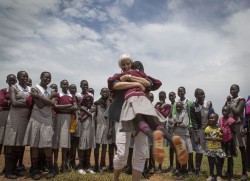Cinema | November 16th, 2016

“Orphans of the Nile” is a 30-minute documentary shot by award-winning WDAY TV reporter Kevin Wallevand and cameraman David Krinke, that describes their September 2016 travel to Uganda with the organization African Soul, American Heart (ASAH) – particularly, with Deb Dawson, ASAH President and three local sponsors Gina Sandgren, Kim Baird, and John Baird. ASAH is a nonprofit with a mission to “protect, educate, and empower” orphans from the Republic of South Sudan during primary school, secondary school, and beyond.
The film will be aired on WDAY television at 6:30 pm on November 16 and there is a special showing of it on November 20th at 3:15 pm at the Fargo Theatre. The Fargo Theatre event will include a question and answer time with the trip participants.
They will also show the 6 minute film “We Have Two Guns,” a 6-minute video by Jessica Mae Wunderlich sponsored by ASAH. Deb and Jessica are working on a feature-length story to highlight the importance of educating women to “improve the lives of all and reduce the likelihood of the type of civil war they are now suffering.”
Kevin Wallevand directed “Orphans of the Nile.” He has been a reporter at WDAY TV since 1983. Other documentaries on his resume include “The Quilt: Hope from the Heartland,” about a quilt sewn in a church basement in a refugee camp in Angola, Africa and “Healing for Haiti,” following a local medical team who went to Haiti to perform surgeries. He has other documentary and series work focusing on Vietnam veterans, Mongolia, Kosovo, Kuwait, and Peru.
Kevin says, “The experience was incredible. The girls are resilient and smart. The scenery is beautiful. There is chaos and tragedy among the people in area refugee camps, but it is another indication how important the Fargo-based program is to saving the lives of these girls.... and keeping them from forced marriage and rape.” He continues, “People should watch the documentary because it is a story of young orphan girls persevering in such adversity, and a great reminder to all of us how so many people around the world live.”
Deb Dawson is impassioned about helping orphans, having adopted three children, one from Korea and two from Russia. Deb met Joseph Adol Makeer, a Lost Boy of Sudan who came to Fargo in 2003 with his orphaned siblings. Deb explains, “Joseph told me he wanted to help orphans in the village he escaped as a ten year old.”
Joseph, who authored the book, “From Africa to America: The Journey of a Lost Boy of Sudan” thought that Americans needed to see how the orphans suffered and that they “would want to help.” Thus, Deb and Joseph, along with NDSU Professor Kevin Brooks and cameraman Matt McGregor traveled to Kakuma Refugee Camp in northern Kenya then on to Joseph’s village of Duk Payuel in southern Sudan. Upon their return, with the help of Greg Carlson, Director of Film Studies at Concordia, they completed the documentary, “African Soul, American Heart.”
Deb says this experience moved them to action: “Kevin, Joseph, and I founded the 501(c) 3 nonprofit African Soul, American Heart in 2008 and began supporting our first five students, boys from Kakuma Refugee Camp in Kenya.”
ASAH has started after-school programs and opened a boarding school in South Sudan in 2012. The project in Uganda which the current documentary details happened after civil war broke out between Dinka and Nuer tribes in the capital city of Uganda, Juba. The conflict reached Duke County, the villagers fled, and “our buildings were damaged or destroyed.”
Deb continues, “Today we have 48 students – one girl and a boy in college in Kenya, and two girls and three boys in secondary boarding schools in Uganda. All the rest are in 1st through 7th grade. Two other young men continue to be supported by Joseph in college, and seven other students have graduated or moved to other programs.”
Deb describes their arrival during the Uganda trip: “The students and staff were waiting for us as this was recognition day. Every teacher at the school was wearing a pink ASAH T-shirt. The ASAH girls comprise 40 of the 200 students at the school. From 1st to 7th grade, in every class, some of our students were recognized as top students. In some classes, they were the only students recognized. I couldn’t have been more proud if they had been my own kids.”
Moreover, Deb explains: “When the girls learned that John Baird was a doctor, they began lining up with their wounds and illnesses. He treated them with tender care.”
Deb tells a story: “Before we left, Kim Baird learned that the ASAH girls didn’t have dolls and stuffed animals, and she got the idea to teach them how to make rag dolls. She made a few samples and partially finished dolls and brought fabric, yarn, embroidery thread and stuffing and taught the ASAH girls how to make dolls for themselves.”
Deb says that the girls now have “proper shoes and clothing for sports and school, books to read, sewing machines to mend their clothes, clean drinking water, nutritious food, medical care, and beds with mattresses and blankets and mosquito nets. They have staff to care for them, to help them with homework, to urge them to work hard at school. These are things that are not available to most refugees, and often not available to most poor people in villages in South Sudan, even before this recent war.” ASAH is developing a plan to ensure the students in the program will have vocational or higher education.
Gina Sandgren attended the trip and sponsors a girl. Gina is a business owner and an instructor in meditation and also works with Act Up! Theatre. She lives in Moorhead but was born in Kenya. Gina explains, “My parents were there for the program, Teachers for East Africa. The ASAH trip not only fulfilled my advocacy desire but also to return to a corner of the world where mine began. My dad dedicated his professional life to educating students, researching and writing about East Africa.”
Gina talks about the 15 year old girl, Rebecca Nyadak Deng, she sponsors: “Her mother died of illness and her dad died in conflict as a soldier in South Sudan. Her guardian is her cousin that lives in a refugee camp in northern Uganda. She may have some siblings in South Sudan. While she was very shy around me she was outgoing with her friends. I think just generally more reserved, like many adolescents around adults, but sweet.”
Gina found particularly powerful the time in Moyo, Northern Uganda where she got to “play, dance, talk and eat together” with the girls and says they even “wrote and performed songs and poems for us. We were treated with such respect and gratitude which we reciprocated.” Gina describes the resilience of the girls as “astounding”: “Despite what they have lived through, what they have seen and lost, they still have hope and the inspiration to do better, be better and return to share what they know with their communities.”
Kim Baird, along with her husband, John, also sponsors a girl. Kim is a fiber artist, quilter, and textile historian, originally from Thief River Falls but a Fargo resident since 1978. Kim’s decision to support ASAH was “pretty much a philosophical decision, because I know that educating women is vital to improving life for everyone.”
Before going on the trip to Uganda, Kim admits that she paid little attention to the letters from Ayuk, the girl they sponsor. It took the “life-changing” trip with ASAH to completely alter her perspective. Now, Kim says, Ayuk is “a person, a sweet girl who would like to become a teacher (as I was).” Kim continues, “I watched the ASAH girls, saw how they took care of each other and worked hard to get an education. Although they are orphans AND refugees from their homes, they have fun and enjoy life. They sing together frequently, and loved it if we joined in.”
She continues, “It is astonishing how far one US dollar will go in Africa. Anyone here can make a real difference by contributing to an organization such as ASAH. It's a difference in the life of a real person, someone not unlike your own son or daughter.”
Deb gives advice to attendees of the Fargo Theatre showing: “Potential audience members might want to bring tissues as ‘Orphans of the Nile’ may trigger tears. The documentary will open eyes to the hardships refugees face fleeing horrific danger in their home country.
Some in our community have been suspicious and angry about refugees in Fargo. I know from nine years working with refugees here and in Africa, that people do not leave their homes without being compelled to do so in order to save their lives and the lives of their children.”
IF YOU GO
Orphans of the Nile: Documentary
Sunday, November 20, 3:15pm
Fargo Theatre, 314 Broadway N
June 9th 2025
June 2nd 2025
May 28th 2025
May 19th 2025
May 12th 2025




__293px-wide.jpg)
__293px-wide.jpg)